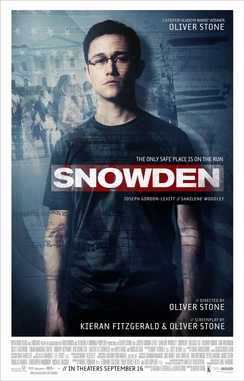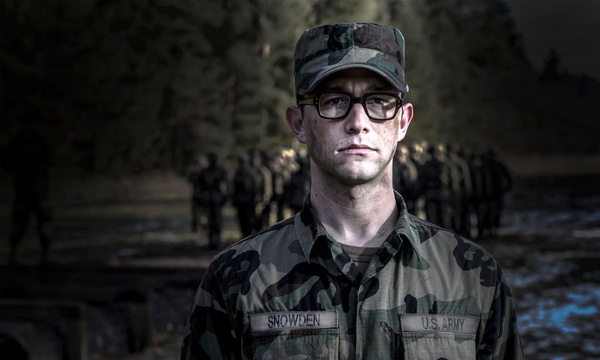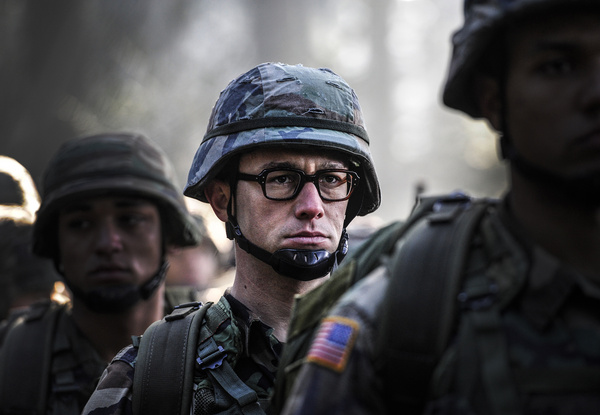Review: The 'Snowden' review that the NSA doesn't want you to see
Posted Tuesday, December 27, 2016 at 3:35 PM Central
by John Couture

When I was asked to review Snowden for our sites, I immediately jumped at the opportunity. I didn't have a chance to see the film in theaters and the combination of Joseph Gordon-Levitt and Oliver Stone was too juicy to pass up.
Up until that point, I had what I would call "passing knowledge" of NSA whistleblower Ed Snowden. That is to say that I knew that he leaked classified information about the government's mass surveillance practices in the wake of 9/11. I also knew that he was a fugitive currently living in Russia.
Sadly, I think that's pretty much all that most people really knew about the situation. For many, Snowden was a traitor and deserved the ultimate punishment for treason, death. For others, he was a hero that brought to light egregious violations of civil liberties made by the U.S. government against its own people.
Obviously, even before I started to wade into this story, it was evident that Ed Snowden was a hot-button issue and I wasn't surprised that Oliver Stone was the filmmaker who made it his mission to bring this story to the big screen. In order to properly evaluate the film and the merits of the story being told, I read the book, "The Snowden Files" by Luke Harding and watched the documentary Citizenfour.
Granted, both of those source materials (as well as the movie Snowden itself) is naturally biased on the side of Snowden, so I read numerous inflammatory missives on the other side and, well, let's just say that there is a reason that our country just experienced one of its most contentious political cycles ever.
No matter whose side you are on, or where you fall on the spectrum of privacy vs. security, the movie itself is a glowing example of the real humanity behind the headlines that we often tend to skip. In the film, Snowden's girlfriend Lindsay Mills is played by Shailene Woodley in what might be her best performance to date. She was also very good in White Bird in a Blizzard, but she's much more restrained here and able to communicate the unspoken pain of making life and death decisions.

Believe it or not, Oliver Stone doesn't delve too deeply into the paranoia and conspiracy that you will find in Luke Harding's book, but instead the savvy director decides to humanize Ed Snowden to remind the viewer that is indeed more than just a name bandied about online. Of course, a large portion of the credit is due to the always wonderful Joseph Gordon-Levitt who is sadly being left out of awards consideration for his performance and that's a shame.
The reality is that Ed Snowden is a difficult character to play convincingly because a lesser actor would simply choose to create a cardboard villain or stooge and leave it there. JG-L goes above and beyond by coming as close as is probably possible in highlighting all of the intricate decisions that must be weighed before someone comes to the conclusion that they will risk their life for what they believe it correct.
No matter how you feel about Ed Snowden or his actions, you have to appreciate the courage that it required for him to put his life on the line to get this information out there. I think most of us fall into the trap of putting too much faith and trust in our government, but at times like these, it's becoming increasingly important for us all to be vigilant about our rights and well being.
The problem with privacy and security is that it becomes a slippery slope quickly once you breached the need for more security. 9/11 was the triggering event that helped to establish a sense of fear that allowed certain people to take advantage of our willingness to trust.
Whether right or wrong, or whether you agree or disagree with his methods, Ed Snowden definitely woke us up to the possibility of corruption within the system. At the end of the day, this amazing country that we live in was founded on and continues to thrive on the vigilant citizenry.
Whether it was a group of patriots objecting the pricing and taxation of tea or an act of defiance by a young man with the highest levels of security clearance, the patchwork of this nation continues to be woven with the blood, sweat, and tears of the finest Americans. As we progress from this information age to whatever the future holds, this film will continue to serve as a reminder that we need to be vigilant about our civil liberties, or else we will one day wake up without them.

The film debuted in theaters before the U.S. elections were held in November, so perhaps it is surprising (or prescient) that there is no mention of Hillary Clinton in the film, yet there is a quick soundbite from Donald Trump about treason and execution. It will be interesting to see how Ed Snowden's story plays out from here.
Given the President-elect's warm relations with Russian President Vladimir Putin, you have to wonder how much longer Snowden will be safe in Russia. Perhaps surprisingly, in doing research for this review, I found out that only a hand full of people have been executed in the United States for treason and a majority of them were during the time of the Revolutionary War.
Herbert Hans Haupt was the last person convicted of treason and executed back during World War II. Others since then have had their sentences commuted or pardoned. One has to wonder if this is a sign of our maturation as a country or the realization that the barbaric methods of old no longer work in today's modern society.
The most profound moment in the film happened in the last few minutes when the camera moved behind a computer while Joseph Gordon-Levitt was delivering a speech as Snowden and when the camera came out the other side, the real Ed Snowden finished the speech.
Again, the lasting impression of the film is to remind the audience of the real humanity that lies behind the headlines. As real-life implications heat up in 2017 for Ed Snowden, this film does a great job of presenting his case for his actions.







